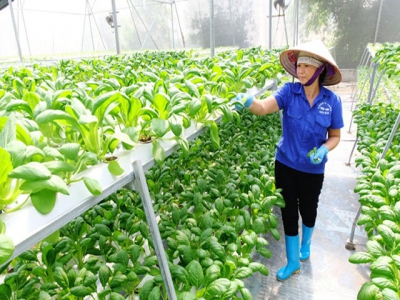FAO kicks off smart farming project in Vietnam

The project targets the northern mountain province of Son La, one of the poorest localities in Vietnam.
Hydroponics farming in Soc Son District, Hanoi. Photo: Ngoc Anh
A four-year project entitled Smart Farming for the Future Generation will be conducted in Vietnam and Uzbekistan in the 2021-25 period, with financial aid from the South Korean Government and technical support from The Food and Agriculture Organization of the United Nations (FAO).
According to FAO, the two countries will benefit from a total budget of US$3.4 million. Interventions will support creating an enabling environment through the development of capacity and policy for greenhouse cultivation of fresh vegetables.
The project targets the northern mountain province of Son La, one of the poorest localities in Vietnam, where has a large ethnic minority population but boasts great potential for high added value vegetables. Farmers and other actors along the value chain, including the post-harvest handling and marketing will have opportunities to benefit.
The information was released at the workshop held by FAO and the Ministry of Agriculture and Rural Development in Hanoi on June 23. Participants, including representatives from FAO, MARD, Fruit and Vegetable Research Institute, Son La Province, and other beneficiaries, discussed the project intervention framework and work plan.
The project will deliver three key outputs, including protected production systems for different vegetables and locations optimized, post-harvest practices and market linkages for different vegetables and locations optimized, and national capabilities on greenhouse production and post-harvest management of vegetables.
Có thể bạn quan tâm
 Agricultural ventures stack up despite lack of profit guarantee
Agricultural ventures stack up despite lack of profit guarantee The number of cattle will rise to over 200,000 by 2025, and the plant has a total annual capacity of 500,000 tonnes.
 Bac Giang consumes over 151,000 tonnes of lychee, accounting for 80 percent of productivity
Bac Giang consumes over 151,000 tonnes of lychee, accounting for 80 percent of productivity As of June 21, Bac Giang province sold more than 151,000 tonnes of lychee with the price of 12 – 55,000 VND per kg of fresh fruit
 Vietnamese lychees reach EU consumers through e-commerce platform
Vietnamese lychees reach EU consumers through e-commerce platform More than three tonnes of Bac Giang lychees have been exported to the EU via the local trading platform Voso and have since passed through customs clearance